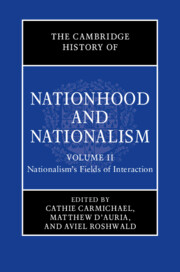Book contents
- The Cambridge History of Nationhood and Nationalism
- The Cambridge History of Nationhood and Nationalism
- The Cambridge History of Nationhood and Nationalism
- Copyright page
- Contents
- Figures
- Tables
- Contributors
- Part I Imperial and Postcolonial Settings
- Part II Transnational and Religious Missions and Identities
- Part III Intersections: National(ist) Synergies and Tensions with Other Social, Economic, Political, and Cultural Categories, Identities, and Practices
- 21 Self-Determination and National Sovereignty
- 22 Citizenship and Nationhood: From Antiquity to Gaia Citizenship
- 23 Religion and Nationhood
- 24 Nationalism and Capitalism
- 25 Economic Nationalism in an Imperial Age, 1846–1946
- 26 National Identity and the Idea of Race in the Dinaric Region
- 27 Nationalism, Ethnic Cleansing, and Genocide: A View from Below
- 28 Warfare, Nation Formation, and the Legitimacy of States: An Ethnosymbolic Perspective
- 29 Nationalism, Terrorism, and the State: Historical Perspectives
- 30 Negotiating National Identity through Tourism in Colonial South Asia and Beyond
- 31 Gendered Nations and Institutions
- 32 Historiographies and Commemorative Practices
- 33 Nation and Literature
- 34 Foodways and Nationhood
- 35 The Dynamics of National Music: Opera and Classical Music in the Nineteenth and Early Twentieth Century
- 36 Media and Nationalism: Europe and the USA, 1500–2000
- Conclusion to Part III
- Index
- References
32 - Historiographies and Commemorative Practices
from Part III - Intersections: National(ist) Synergies and Tensions with Other Social, Economic, Political, and Cultural Categories, Identities, and Practices
Published online by Cambridge University Press: 08 November 2023
- The Cambridge History of Nationhood and Nationalism
- The Cambridge History of Nationhood and Nationalism
- The Cambridge History of Nationhood and Nationalism
- Copyright page
- Contents
- Figures
- Tables
- Contributors
- Part I Imperial and Postcolonial Settings
- Part II Transnational and Religious Missions and Identities
- Part III Intersections: National(ist) Synergies and Tensions with Other Social, Economic, Political, and Cultural Categories, Identities, and Practices
- 21 Self-Determination and National Sovereignty
- 22 Citizenship and Nationhood: From Antiquity to Gaia Citizenship
- 23 Religion and Nationhood
- 24 Nationalism and Capitalism
- 25 Economic Nationalism in an Imperial Age, 1846–1946
- 26 National Identity and the Idea of Race in the Dinaric Region
- 27 Nationalism, Ethnic Cleansing, and Genocide: A View from Below
- 28 Warfare, Nation Formation, and the Legitimacy of States: An Ethnosymbolic Perspective
- 29 Nationalism, Terrorism, and the State: Historical Perspectives
- 30 Negotiating National Identity through Tourism in Colonial South Asia and Beyond
- 31 Gendered Nations and Institutions
- 32 Historiographies and Commemorative Practices
- 33 Nation and Literature
- 34 Foodways and Nationhood
- 35 The Dynamics of National Music: Opera and Classical Music in the Nineteenth and Early Twentieth Century
- 36 Media and Nationalism: Europe and the USA, 1500–2000
- Conclusion to Part III
- Index
- References
Summary
When the German national parliament, the Bundestag, held a ceremony to commemorate the seventieth anniversary of the end of the Second World War on 8 May 2015, the historian Heinrich August Winkler was asked to deliver the main address. In his speech, Winkler confirmed the central role of National Socialism and the Holocaust for German national identity. Germany’s responsibility for genocide and war meant, seventy years after the events, a special responsibility toward Israel, and for the states of east-central and eastern Europe, which had suffered most terribly under German occupation, and for the European Union project as a project of peace and reconciliation in a continent where German hypernationalism had brought destruction on a hitherto unprecedented scale.
Keywords
- Type
- Chapter
- Information
- The Cambridge History of Nationhood and Nationalism , pp. 682 - 705Publisher: Cambridge University PressPrint publication year: 2023



